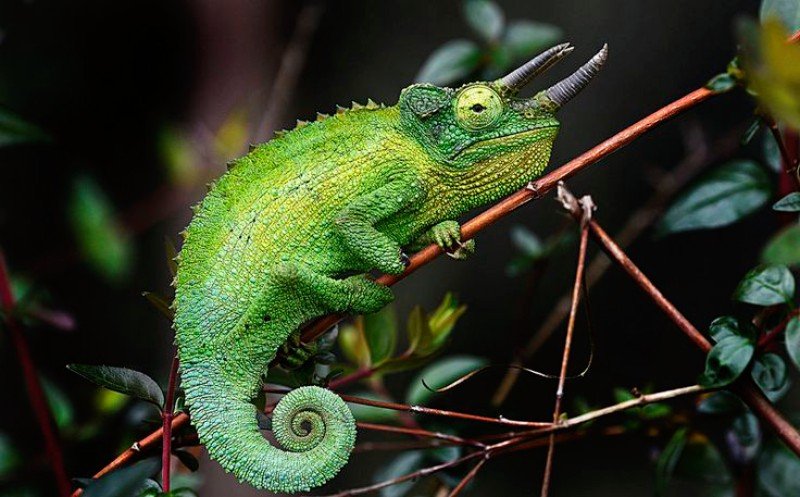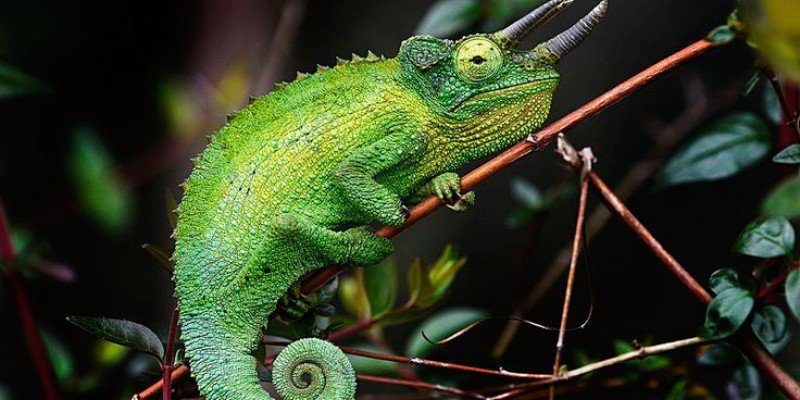
Imagine having a pet that’s not only captivating to watch but also has its own little quirks, just like us. This article dives into how long these chameleons really live, what affects their lifespan, and some tips on keeping them healthy so they can thrive. Whether you’re considering getting a Jackson’s chameleon or just curious about them, let’s explore their lifespan together!
Understanding Jackson’s Chameleon Lifespan
To start, the average lifespan of a Jackson’s chameleon is around 5 to 10 years in captivity. However, this can vary based on several factors like genetics, environment, and care. In the wild, their lifespan tends to be shorter, often because of predators and environmental challenges. Think of it this way: when they’re in a more controlled setting, like your home, it’s like having a little safety net that can help them live longer.
While it’s really interesting to know the average lifespan, it’s essential to realize that not all chameleons will live to that age. Just like us, some might face health issues or other challenges. Having a closer look at what influences their lifespan can give us clues on how to ensure they get the best life possible.
Factors Influencing Lifespan
Several key factors can affect how long your Jackson’s chameleon lives. Here are a few of the most impactful ones:
- Diet: A balanced diet rich in various insects, greens, and supplements is vital. Just like we need good nutrition to stay healthy, so do chameleons.
- Environment: Proper humidity and temperature levels are crucial. Imagine being too hot or too cold; it wouldn’t feel good, right? For chameleons, a comfortable home means a longer life.
- Stress Levels: Chameleons can be sensitive to their surroundings. A noisy home or frequent handling can lead to stress, which can impact their health negatively.
- Genetics: Just like humans, some chameleons come with a predisposition to certain health issues. Researching the lineage of your chameleon can give you insights into their potential lifespan.
By paying attention to these factors, you can help your pet reach its full potential lifespan.
Signs of a Healthy Chameleon
Keeping track of your chameleon’s health can make a big difference in its lifespan. Here are some signs to look out for that indicate your Jackson’s chameleon is thriving:
- Active Behavior: Healthy chameleons are curious and actively explore their environment.
- Bright Colors: If your chameleon’s colors are vibrant, it’s often a sign of good health. Dull colors can indicate stress or illness.
- Good Appetite: Eating regularly is a fantastic sign! A chameleon that skips meals might be dealing with health issues.
- Proper Hydration: You should see them drink water or enjoy misting. Dehydration can be harmful and shorten their lifespan.
Taking note of these signs helps you catch any potential issues early on, giving you a better chance of supporting a long and healthy life for your chameleon.
Providing Proper Habitat Conditions
Creating the right habitat for your Jackson’s chameleon is crucial for its well-being. You’ll want to think about several important aspects:
– Enclosure Size: A larger space allows for natural climbing and movement. A minimum of 24x24x48 inches is recommended, so they have room to roam.
– Temperature Gradient: Provide a basking area that’s around 75°F to 85°F and a cooler area around 65°F to 75°F. This gradient helps them regulate their body temperature properly.
– Humidity Levels: Keeping humidity between 50% to 70% is ideal. Misting the enclosure regularly can help maintain these levels, just like how morning dew refreshes a plant.
– Hiding Spots: Include branches, plants, and other decor to create a comfortable environment. Chameleons appreciate places to hide where they can feel secure.
By setting up the right habitat, you’ll not only enhance your chameleon’s life but also increase its chances of living a longer, healthier one.
Feeding Your Jackson’s Chameleon
A nutritious diet is essential for your chameleon’s longevity. Here’s how to provide the best meals:
– Variety of Insects: Feed your chameleon a mix of crickets, roaches, and worms. Each type offers different nutrients, just like how we need various foods for balanced diets.
– Dusting with Supplements: Sprinkle calcium and vitamin supplements on the food several times a week. This extra boost contributes to strong bones and overall health.
– Fresh Greens: Offering greens like collard greens or dandelion leaves can round out their diet. Think of it as adding a salad to your meal!
– Water Sources: Besides misting, you can provide a shallow dish of water, but be cautious so they don’t drown. Hydration is key!
Feeding your Jackson’s chameleon right not only keeps it healthy but can also influence how long it lives.
Common Health Issues and Solutions
Just like us, Jackson’s chameleons can face health problems that may impact their lifespan. Here are a few common issues and how to address them:
– Respiratory Infections: Symptoms include wheezing or lethargy. If you spot these signs, consider consulting an exotic pet vet quickly.
– Metabolic Bone Disease (MBD): Poor diet or lack of UVB lighting can lead to MBD, causing weak bones. Ensure proper care and consult a vet for treatment options.
– Dehydration: If your chameleon appears sunken-eyed or lethargic, it might be dehydrated. Increase misting and hydration options immediately.
By knowing these potential problems, you can act swiftly to ensure your chameleon’s well-being.
In conclusion, knowing how long Jackson’s chameleons live is just the start. By understanding the factors that influence their lifespan—including diet, environment, and health—you can better care for these captivating creatures. Every decision you make can help them lead a longer, healthier life.
Remember, each chameleon is unique, and with love and attention, you can create an environment where they thrive. Whether you’re a seasoned chameleon owner or just starting, the journey with these amazing reptiles can be incredibly rewarding. Your Jackson’s chameleon relies on you for its care, and by putting in the effort, you can help it live its happiest, longest life possible!

